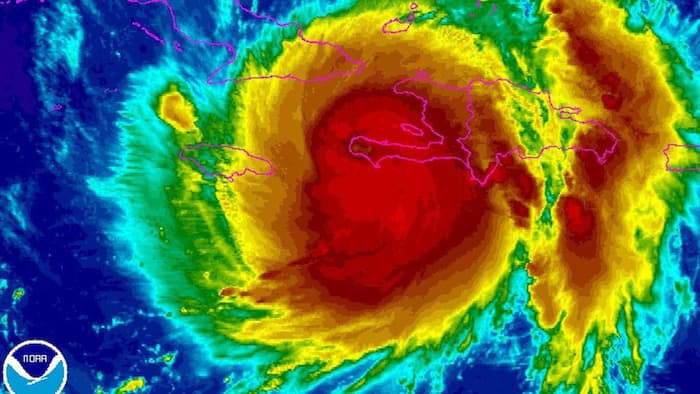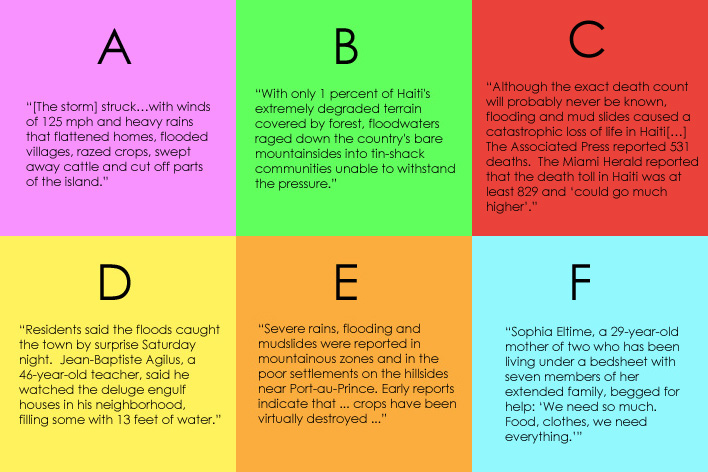
Let us be clear. Here at HaitiHub HQ, we are heartbroken over the loss of life, livelihoods, and homes caused by Hurricane Matthew in Haiti and we support the important relief work that is happening in the immediate aftermath. Our prayers go out to those suffering. Our gratitude goes out to those providing direct emergency assistance.
However (and it’s a crucial “HOWEVER”), let’s play a matching game.
MATCH THE SNIPPET OF NEWS COVERAGE WITH THE NATURAL DISASTER IT DESCRIBES.
1) Hurricane Gordon, which killed 1100 people in Haiti in 1994
2) Hurricane Georges, which killed 400 people in Haiti in 1998
3) Tropical storm Jeanne, which killed at least 1900 people in Haiti in 2004
4) Hurricanes Fay, Gustav, and Hanna, which killed 800 people in Haiti in 2008
5) The earthquake, which killed at least 250,000 people in Haiti in 2010
6) Hurricane Matthew which killed approximately 800 people in Haiti in 2016

If this matching game seems impossible, well… I’m with you. It’s damn near impossible to differentiate the accounts of Hurricane Matthew’s aftermath from descriptions of other natural disasters that have regularly devastated parts of the country over the years. (And we could have gone MUCH further back than 1994 – Hurricane Flora in ’63, Hazel in ’54, unnamed storm in ’35…)
Does this make Haiti the most weather-unlucky country in the Caribbean? No.
Every country on Earth has to deal with weather. The difference is that the U.S. and other developed countries try to “deal with” weather BEFORE thousands of lives are lost to a natural disaster. We do this with zoning laws that prohibit people from building homes in dangerous areas, we do this with state-funded flood-mapping projects, we do this with environmental policies that prevent America from becoming over 90% deforested, we do this by collecting and then spending tax dollars (local and federal) on things like paramedics, firefighters, and even the national guard who can save lives in the event of an emergency.
ALL of these things (zoning laws, state funding, national policy, tax spending, infrastructure development…), ALL OF THESE THINGS can only be done by a country’s government. And without these things, a place like Haiti will always suffer disproportionately from storms and earthquakes.
So the questions for us as the international community are:
1) As we go about our important short-term work, what are we doing that inadvertently weakens or circumvents the Haitian government?
2) As we plan our future involvement in Haiti, what will we actively do to help strengthen and legitimize the Haitian government?
The work that NGO’s, churches, universities, and development professionals do is important work; it’s life-saving work. We’ve seen this. We know this and are humbled by people’s service. And we also know that the Haitian government can be inefficient, inexperienced, and corrupt. But there is no other path to prosperity except through a functioning, empowered Haitian state. THERE IS SIMPLY NO ALTERNATIVE.
If we leave those two questions up there unexamined, then we have to admit that we do not have a long-term plan for Haiti’s prosperous future and we do not care to have one. In that case, we’ll have to admit that we’re okay with another century of the disaster/relief, disaster/relief, disaster/relief pattern that has brought us to where we are now, in 2016, dealing with the tragic aftermath of Hurricane Gordon…
I mean Matthew.
Co-written by Carlo Diy and Erin Nguyen on October 30, 2016
Impossible Matching Game Answers: 1C, 2E, 3D, 4B, 5F, 6A
Dates and Figures Sourced: Associated Press archives, U.S. Geological Survey / Seattle Times
Press Release Sources:
http://www.cnn.com/2016/10/08/americas/hurricane-matthew-death-toll-haiti/index.html
http://reliefweb.int/report/haiti/hurricane-gustav-hanna-pound-weary-haiti
http://hurricanecentral.freeservers.com/Prelim_Reports/1994_Gordon.htm
http://usatoday30.usatoday.com/weather/news/2004-09-19-jeanne-haiti_x.htm
http://www.fao.org/english/newsroom/global/GW9827-e.htm
https://www.theguardian.com/world/2010/jan/20/haiti-hit-by-second-earthquake
